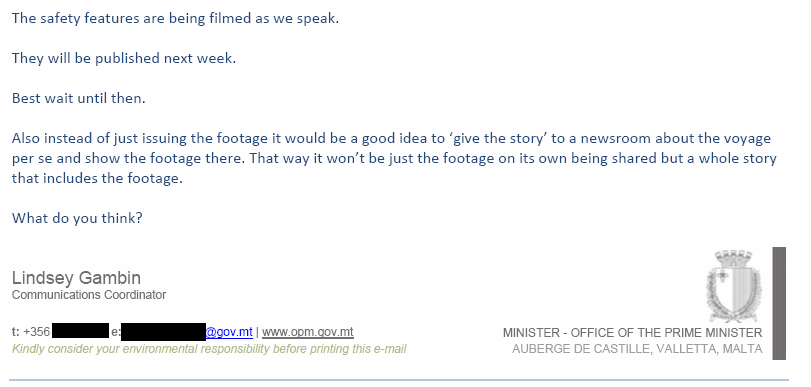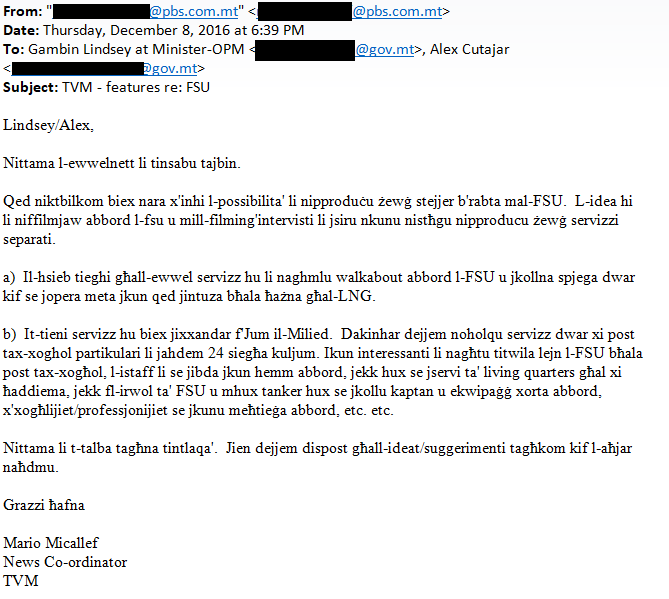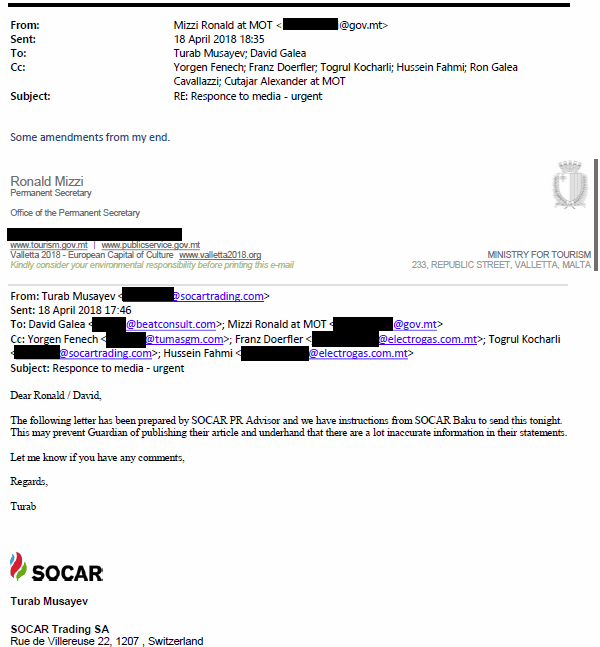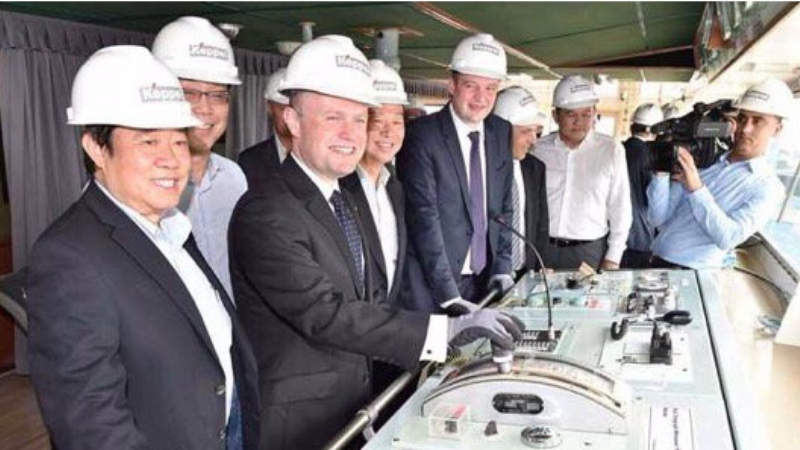Email exchanges seen by The Shift show how communications aides for the government and Electrogas were tirelessly working to make the entrance of the FSU tanker and the first shipment of liquefied natural gas (LNG) appear to be a historic moment for the nation.
The Labour Party TV station and PBS feature repeatedly in conversations between Konrad Mizzi’s communications team, Alex Cutajar and Lindsey Gambin, and Catherine Halpin, the commercial director of Electrogas.
PBS has recently been allocated increased funding of €30 million for five years. The leaked emails raise further concern about the government’s use of the public broadcaster as yet another propaganda tool.
Mizzi’s right hand man at the time, Cutajar, had a particularly busy time ahead of the ship’s arrival in 2017. He was taking care of organising the public relations and marketing, and the emails indicate that media requests for comments or features had to go through him.
The press conference announcing the arrival of the first shipment of LNG was planned to take place at the Delimara Fort. However, Halpin seemed a bit concerned that the Fort was not “looking great” because of ongoing excavations.
She also wanted to make sure that a small token be given to the LNG vessel captain – a frame with a photo of the vessel displaying the ship-to-ship transfer (STS), with an engraving, saying ‘First LNG cargo, Electrogas Malta’ – being presented after the transfer was completed, not before.
“It would be nice to make one for ourselves, each shareholder, bumi [Bumi Armada] and the LNG carrier master. Normally this presentation is done after the STS (not to tempt fate),” Halpin wrote.
Time would prove that this tanker was indeed an icon; not for lower energy bills, but for corruption and murder. Today marks 35 months since Daphne Caruana Galizia was assassinated while investigating a cache of leaked emails from Electrogas that she had received. Yorgen Fenech is accused of commissioning her death by a car bomb on 16 October 2017 in an attempt to bury what she was about to reveal about the deal.
‘Give story to PBS’
Ahead of the first shipment of LNG, the communications aides were tasked with announcing the arrival of the MV Armada Mediterranea, the tanker that would supply gas to the new power station.
Emails show that Cutajar stressed that the government needed to “run some features relating to gas safety” and related training before any footage of the massive LNG tanker heading towards Malta is released to the public.

Emails show how government communications aides effectively handled Electrogas’ PR including ensuring safety feature programmes are aired well before any footage of LNG tankers are made public in order to “soften the audience”.
Electrogas’ advertising agency had suggested that footage of the arrival of the tanker be released to all newsrooms at one go. However, Gambin, a former reporter at the Labour Party TV station, suggested that it would be wiser to “give the story” to a newsroom.
PBS was the obvious first choice, emails show.
In December 2016, the public broadcaster had, in fact, requested two features to be compiled about the MV Armada. One of the news features would be a “semi-technical one”, as the news coordinator put it, while another will be released on Christmas Day. It is one of the slowest days in the newsroom and PBS thought of featuring the tanker to accompany the stories of the nativity.
This email from a PBS “news coordinator” to Gambin and Cutajar, then both officials entrusted with OPM’s Projects Division’s marketing, ended with a obsequious offer that “he is always open to ideas and suggestions as to how best to work”.
Emails from the same period show that Johann Grech, who at the time was working at the Office of the Prime Minister, always had a taste for scenic footage even before being appointed to lead the Malta Film Commission.
Emails from November 2016 have Grech instructing Cutajar to organise new footage for a “government production”. Halpin cautioned Cutajar that the use of a drone in the area might be illegal.

PBS gives a new meaning to news coordination with news stories about Electrogas being pitched to OPM and open offers for “ideas and suggestions”.
Replies to media go through government
Email exchanges show how the government was consulted whenever the team received questions from the media, with guidance or even draft replies frequently being promptly supplied by OPM.
On 17 April 2018, Franz Doerfler, CEO of Electrogas, received an email from a financial correspondent at The Guardian, as part of a joint investigation that revealed Malta was paying “hand over fist” for gas from Azerbaijan’s state-owned company SOCAR.
The email was also received by Turab Musayev, SOCAR Trading’s representative on the Board of Electrogas who, in turn, asked Yorgen Fenech whether he thought Electrogas should reply.
“I believe it was sent to Siemens, as well. Can you please check whether any of the factual information below is not in public knowledge? Yorgen, any view whether EGM (Electrogas) should reply?”
Within hours, Doerfler would email the others, saying that Ronald Mizzi, the permanent secretary at Konrad Mizzi’s Ministry, told him they would receive a proposal on how to reply from the government.
“I have just got a call from the Sec. of Ronald Mizzi. We will receive a proposal on how to answer from GOM (Government of Malta),” according to the email.

Separately, SOCAR also ran their own replies to The Guardian’s queries past Ronald Mizzi and David Galea from Beat Ltd noting that this letter from their UK defamation lawyers (described euphemistically as PR Advisors) may “prevent Guardian [from] publishing their article”.
Again Ronald Mizzi obligingly provided the government’s input on the letter’s contents, including deleting from the letter the phrase: “The process was a standard EU tender process and fully compliant with EU public procurement rules”.
The government celebrated the increased investment of €30 million in the public broadcaster with Minister Carmelo Abela saying that this money will serve to “implement the reform needed within PBS”. Yet these leaked emails shed light on how the government is using the public broadcaster paid by taxpayers’ money to push its agenda.












